Not even the most optimistic Sony executive would have dared imagine the PlayStation 4's extraordinary success during its first year on the market. By October, PS4 sales soared past 13.5 million units in its first eleven months, meaning it is currently outpacing the best selling console of all time, the PS2, and even aligns it with the stupefying early success of the Nintendo Wii.
But for those who haven't yet bought into Sony's next-gen system, is it time to make the jump?
Today, to mark the first-year anniversary of the PS4 launch, GameSpot is providing a comprehensive buyer's guide that dissects and scrutinises every key aspect of the console. From the hardware, to the software platform, to the games library itself, GameSpot is evaluating each of these aspects to help answer one simple but important question for any gamer: Should you buy a PS4?
- The Hardware Gets Everything Right
- The DualShock 4 is a Major Upgrade From PS3...
- ...But It's Not Perfect
- The PlayStation Camera is Somewhat Pointless
- The PS4 is a Mediocre Media Player
- PS Vita Remote Play is a Neat Party Trick, But No Revolution
- Everything in Its Right Place
- A Console That Prioritises Speed
- No Lie: PS4 Has Genuinely Useful Social Features
- Share Play Lets Friends Trade for Free
- Finally, a Digital Store That Rivals Steam...
- ...And It Boasts Uncommon Generosity
- PS Plus is an Offer You Can't Refuse...
- ... But It Could Be Better
- PlayStation Now Isn't Worth Your Time
- PSN Outages Are a Recurring Nightmare
- Right Now, There Are No Defining PS4 Exclusives...
- PS4 is an Indie Games Haven
- VERDICT: Is It Time to Buy a PS4?
On Tuesday November 18, GameSpot will mark the two-year anniversary of the Wii U's release with a similarly styled analysis. Then on Saturday November 22, we'll conclude with a breakdown of the Xbox One.

The Hardware Gets Everything Right
PS4 carries a meaningful raw power advantage over its peers, whilst also managing to be one of the smallest and sleekest systems available, and almost paradoxically, isn't particularly more expensive either. It is difficult to recall a games console over the past 40 years that has achieved these key hardware objectives in unison so harmoniously.
These advantages have been paying off for Sony from day one, and continue to do so: Some, but not all, multiplatform games render at a superior frame-rate and resolution on PS4 than on Xbox One. That's worth considering if you're eager to buy a new games console soon. The difference isn't night and day, but considering the endless similarities between the Xbox One and PS4, a small differentiator can seem like a big advantage.
However, the PS4's upper hand in this regard won't last forever, especially as coders begin to master the Xbox One's hardware. Then again, when first-parties begin to harness the full potential of PS4, the results could be quite striking.
Of all the flagship creations in Sony's history, it is no exaggeration to say PS4 stands as one of the finest
The shell that surrounds the PS4 is another triumph. The rhombical casing is compact and unassuming with a dash of flamboyance, and versatile enough for kids' bedrooms, dirty college dorms, or a thirtysomething's IKEA-inspired living space. PC systems may be able to outmuscle the PS4 in terms of horsepower, but not quite at this price and certainly not at this size.
Additional benefits become more appreciated over time; such as the generally impressive install speeds (certainly when compared to the Xbox One), or the relatively quiet manner in which the system operates. It's also now available in white.
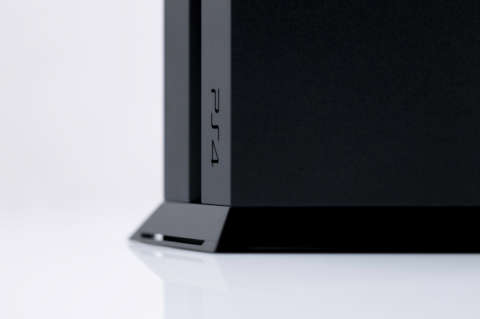
One negative consideration for those wanting a 4K future: PS4 only supports video and images in this high-end resolution, not games. Also, it's not compatible with Bluetooth remotes or mice, but keyboards work.
Those minor caveats aside, PS4 is a console with remarkably accomplished foundations. It is a poignant reminder that Sony is not just a struggling electronics empire, but an institution of consumer hardware design and innovation, one that happens to pre-date the moon landing.
Of all the corporation's flagship creations in its 68-year history, it is no exaggeration to say that PS4 stands as one of the finest.
The DualShock 4 is a Major Upgrade From PS3...
Sony has embraced the west's increasing dominance as a games market, not just as a painful reality, but as a pillar ideology that informs its decisions. Few things typify this better than the PS4 controller; an enlarged gamepad that fits perfectly in American and European palms, designed with first-person shooters in mind.
Consequently, the analogue sticks and triggers have made significant strides since the PlayStation 3, now resplendent with enhanced grip and curve for control and comfort. Perhaps most significant is a subtle difference; the handles have been lengthened and moulded into a more cylindrical shape, and are slightly narrowed in angle too, which makes for a marvellous fit.
As a bonus, the charge and headphone inputs are non-propriety, meaning any micro-USB cable and headphone jack can be used with the controller. The system comes packaged with these, but if you have an Android phone with a hands-free kit, you've probably already got some reliable backups.
It's also an ideal controller for those trying to keep quiet at night, thanks to a brilliant feature that allows the audio to be redirected solely through the headphones. And although the pad's internal gyrometer doesn't feature in many games, it does make typing on the virtual keyboard surprisingly fast and straightforward.
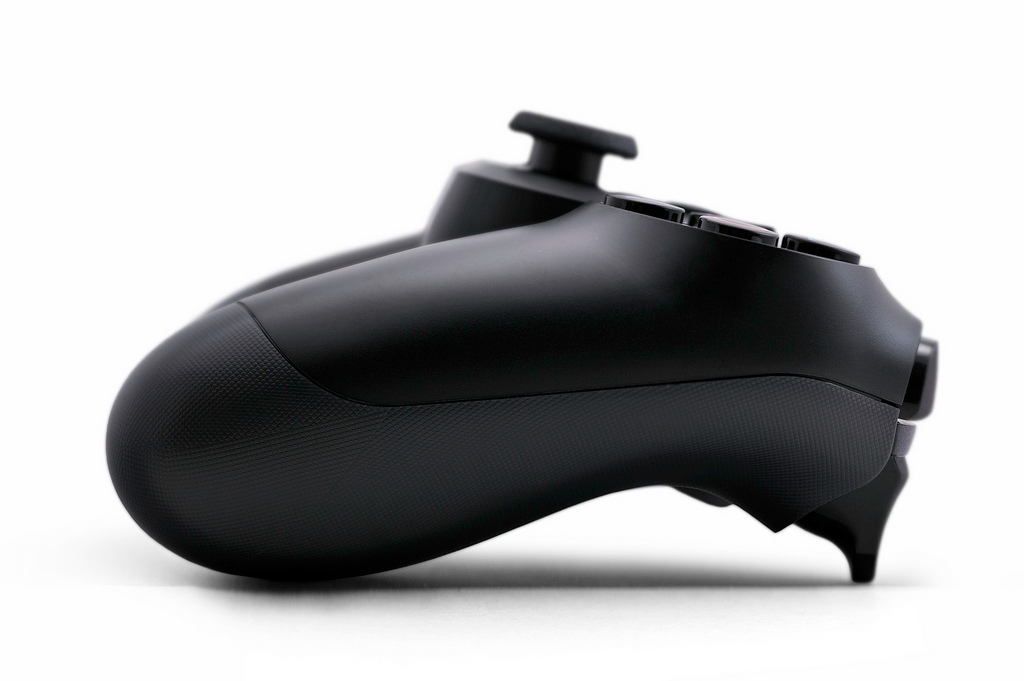
...But It's Not Perfect
The battery life is unequivocally poor, and some would say it's outright awful for a modern games controller. In practice, it doesn't last half as long as its predecessor, and dies far quicker than the Xbox One and Wii U Pro Controller. The official line is that it offers eight hours of use from a full charge, but our experiences suggest this is a slightly optimistic figure, with the battery recharge usually becoming necessary on the sixth or seventh hour. The DualShock 4's battery problems are partly due to it being burdened by the power demands of an internal speaker, a somewhat worthless light bar at the front, additional rumble motors, and a touchpad.
The battery life is unequivocally poor, and some would say it's outright awful for a modern games controller
Speaking of that touchpad, few developers have found inspiration from it. Games such as Destiny and Metal Gear Solid V: Ground Zeroes simply map it as an extra button or two. While the touchpad is perfectly functional as an additional button, it's also a missed opportunity. Sony needs to set a better example of its unique potential.
Meanwhile, over time, the analogue sticks' rubber coating will likely begin to break apart. Only slightly at first, but in some cases quite drastically. If you're not seeing some signs of this problem by the end of your first year, consider yourself fortunate.
If you're keen on getting a PS4 and have cash to burn, it's worth thinking about buying a second controller that you can swap while the other charges. (Pro-tip: You can use a PS Vita as a rudimentary second controller.) There's also a range of third-party micro-USB cables that, while not a perfect solution, can be handy.
The PlayStation Camera is Somewhat Pointless

Though the PS4's add-on camera can cleverly recognise your face as the system boots up, you'll still need a controller to log in, so it's tricky to find much value in it. The set of voice commands are basic, though reliable, yet it's likely that you'll naturally stop using them over time.
Very few games use the peripheral, and it's hard to imagine too many more will. Those who like to stream games via Twitch, however, may find its basic webcam function as a useful bonus. It's also worth considering that the camera will likely be a necessity for Sony's VR headset, Project Morpheus (that is, of course, if the peripheral is ever released).
Bear in mind too that the PlayStation Camera is a grand master at dislodging itself if placed atop the TV. The heat emitted from a television will easily loosen the tiny square of glue that is supposed to be holding the unit in place, and it will routinely fall off unless secured in position through improvised means.
The PS4 is a Mediocre Media Player
The PS4's reluctance to read media from external hard-drives is a clear stance against piracy, yet also an honest inconvenience for those who missed an episode of Game of Thrones and want to stay in the loop. It's an understandable position for Sony to take, but one that inevitably makes the Xbox One, and even the PS3 and Xbox 360, more suitable for modern lifestyles.
At the time of writing, the system supports music playback, but only via USB. It doesn't read CDs either, though it does offer a paid-for Music Unlimited subscription service. As executives from Sony have previously hinted, future firmware updates may open up more of the PS4's media capabilities, or at the very least DLNA support for network media streaming, but for now the system could hardly be recommended as an all-encompassing media playback solution.
The updated Live From PlayStation app, meanwhile, offers Twitch and UStream footage, though usually at unwatchable resolutions. If you have a capable internet connection, the Xbox One tends to stream Twitch gameplay at noticably superior quality.
For most people, these setbacks won't be too major a problem. PS4 is an adequate Blu-ray and Netflix machine, plus it has YouTube, Amazon Video, Crackle, Crunchyroll, EPIX, Hulu Plus, Vudu, YuppTV, the WWE Network, and apps for live footage of NFL, NBA, MLB, and HNL. Sony's own video store isn't too shabby either. Meanwhile in the UK, PS4 also has the BBC iPlayer, and is set to introduce Sky Go for the first time, which is a coup for Sony (the Xbox 360 had this service exclusively for several years).
PS Vita Remote Play is a Neat Party Trick, But No Revolution
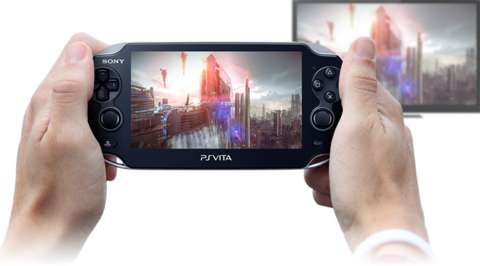
It seems unfair to dismiss an audacious technology that so capably streams PS4 gameplay onto the PS Vita handheld. But performance is not the problem with Remote Play. The real issue is purpose.
It takes a specific set of circumstances for Remote Play to enter into the equation: If you really can't use the TV, and if you have a fast home network, and if you want to play a game that doesn't demand lightning-quick reactions, and if that game does not require more than two shoulder buttons, or the analogue stick buttons, and if you're sitting close enough to your PS4 (or router), and if your Vita has enough charge, then feel free to indulge.
But even then, it's hard to ignore how you are shrinking the full-screen splendour of a PS4 game onto a handheld, complete with all the imperfections and inevitable artefacts one should expect with streaming high-density content.
It can still be fantastic on the right occasion; listening to all those secret tapes in Ground Zeroes whilst doing the dishes in the kitchen offers a moment to ponder just how far we've come since the Atari days.
With compatibility expanding to the PlayStation TV microconsole, and the Xperia Z3 smartphone, Remote Play could still have a bright future ahead. For now, it's cool, but only a few will swear by it.

Everything in Its Right Place
When an operating system works, you shouldn't notice. So it should be taken as the highest praise possible that the PS4's software platform is effortlessly, naturally inconspicuous.
That famous Jobsian principle, "it just works", is entirely applicable here. The OS is littered with little ideas and evidences that someone, somewhere, had designed them all with that indistinct notion of "the experience" in mind. It manifests in all the small things, such as the option to delete or pause apps mid-download. Or the seamless switching between game and front-end. Or the depths of customisation, right down to tweaking what the PlayStation can do on standby. Or the option to share your games to all users of the console, each with their own save files. Or the option to access your digital library on another PS4. Or the notification centre which helps you stay on top of everything. Or even the life-saving cut-copy-paste options in the text window.
But the perhaps the greatest achievement of all is how everything manages to be presented in such a straightforward manner. The home page displays a horizontal belt of your most recently used software, be it games or apps. Meanwhile, a smaller row of system icons (options, the PlayStation Store, Friends etc) is fixed atop the screen. Very quickly it's understood that one line is for content and the other is for the system, and due to this single rule, navigation becomes a breeze.
Thanks to the 2.0 Masamune update, as many as 15 of your most recent items can be displayed on the homepage belt. However, at the time of writing, there is still no folder support, nor the option to 'pin' your most important game or app.
A Console That Prioritises Speed
Top of the (many) complaints regarding the PS3 was the unbelievable number of mandatory updates that acted as roadblocks. This curse has finally lifted with PS4, as the system can download updates when on standby, and for PlayStation Plus subscribers, can automatically upload and patch them too. It's touches like these that make the PS4 a system that clearly prioritises your free time. As such, it is one that revitalises that God-given impulse to take a game for a quick spin without fear of console admin work.
Perhaps an equally impressive feat is the play-as-you-download feature, which allows access to games long before they have finished downloading. EA's PS4 launch game Need For Speed Rivals weighs about 16GB, for example, but only 3.75GB is required to start playing. Understandably, with only a fraction of assets downloaded, at this point only two levels of the game are playable.
No Lie: PS4 Has Genuinely Useful Social Features

The games industry's first 'big idea' for social media was the same approach it takes with all other non-games services: Just throw it in.
Evidently, this was a mistake. No one with a smartphone and an IQ wanted to browse a rudimentary Twitter client on their Xbox 360 or PS3, nor write with an on-screen keyboard that is navigated by d-pad.
PS4 is the first console that takes a common-sense approach to social media. First, Facebook profiles can be tied to PlayStation Network accounts, which means your real-life profile can, if you wish, be your avatar that appears throughout the service and on friend requests (this also automatically updates whenever you change your Facebook profile pic--a neat touch).
Second, and more importantly, is the Share button, which allows players to publish snapshots of their in-game moments onto Facebook and Twitter. Right now you won't see these images too often in your Twitter feed, and even less so on your Facebook timeline, but the key is that Sony has made the process easy. It's a matter of time before developers begin to exploit the console's innate sharability, and hopefully in a way that people can enjoy.
Facebook can also publish video clips of in-game video, though unfortunately these can't be published on Twitter yet (which ironically is the better platform for sharing video snippets). Yet perhaps the most impressive addition is Twitch integration, where players can begin to broadcast their games at a touch of a button.
YouTube uploading is also a simple process, further enhancing the PS4's position as a superior platform for people who like to publicise their gaming feats.
The more rudimentary social features are still intact, by the way, such as party chat and messages, all of which work perfectly. Meanwhile, with the right settings enabled, players can buy games via their PlayStation smartphone app and prompt their PS4 to download the content remotely. Like magic, when you arrive back at home, the game will be ready.
Share Play Lets Friends Trade for Free
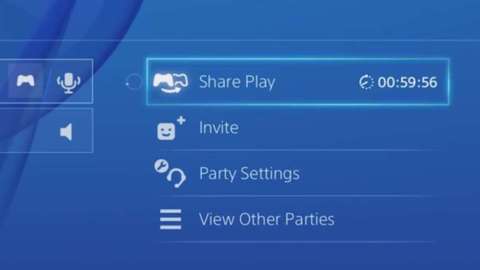
Perhaps the most strikingly generous of all PS4's features is Share Play, which allows friends to share their games across the internet.
One PS4 owner can invite another to privately watch gameplay footage remotely and--providing their connection speed is up to the job--can even allow them to take control of the game.
There are numerous security features that ensure this process is safe and won't compromise privacy, and only the host needs a PS Plus account for it to work. (Share Play can also allow players to take part in co-op, but both accounts need PS Plus for this).
What is most extraordinary about Share Play is how unrestricted it is. Players can share a game for sixty minutes before the connection is severed, but this can be re-established immediately afterwards, and there are no limits to how many times this can be done. Ultimately, the outcome is that players can legally play through entire games without ever buying them.
Of course, the hourly interruptions discourage this, and the streamed data runs at a lower frame-rate and resolution, meaning that buying your own games still come with distinct benefits. But for free, users could hardly be offered much more than this.
However, at the time of writing, various publishers and developers have blocked Share Play on as many as 14 games. The idea of sharing a game freely over the internet is, understandably, not something that the publishing industry is unanimously in favour of.
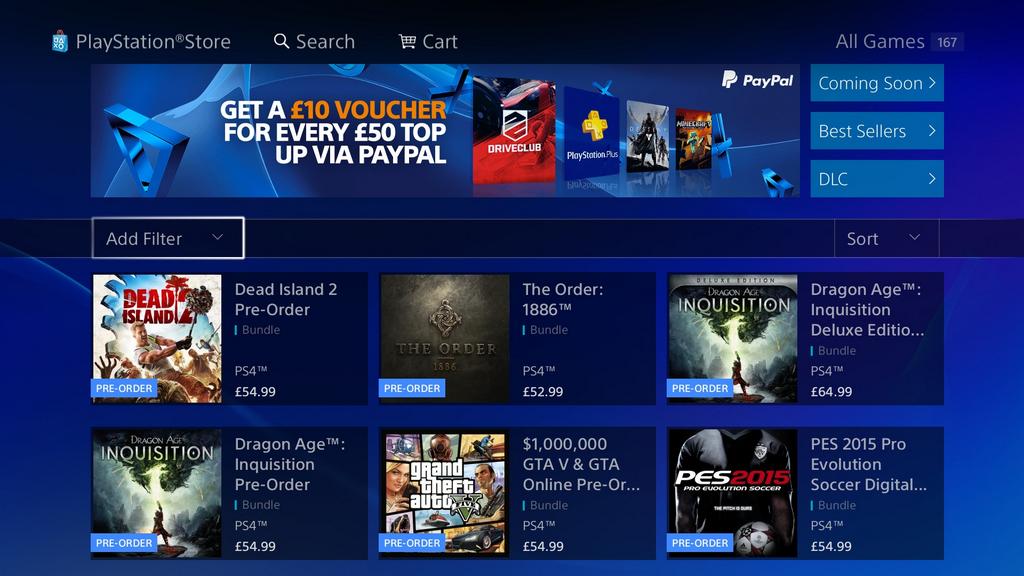
Finally, a Digital Store That Rivals Steam...
The PlayStation Store has embraced the buying and playing habits of the modern consumer in the same spirit as Valve did about half a decade ago. Better late than never.
Not only are there exclusive discounts for PlayStation Plus subscribers across the library, but on a regular basis Sony will host limited promotions where a collection of digital games will be slashed in price. It doesn't come close to the value on offer on Steam or GOG.com, but Sony is certainly guiding its digital store in the right direction.
The PS Store doesn't come close to the value on offer on Steam or GOG.com, but it's certainly going in the right direction
As a bonus, there are no adverts populating the screen, though the store does sometimes promote content available from its partners.
...And It Boasts Uncommon Generosity
Cross-buy is also a major benefit. Purchasing a game on PS Vita, PS3 or PS4 sometimes means that it will also be accessible for free on other Sony platforms too (that is, of course, if the game code has been ported). At the time of writing, more than 18 PS4 games feature Cross-Buy support, such as Hotline Miami, Child of Light, Sound Shapes and OlliOlli. However, the service isn't mandatory, with the likes of Fez and Minecraft not featuring Cross-Buy support.
PS Plus is an Offer You Can't Refuse...

It is hardly a surprise that at least half of PS4 owners pay for PlayStation Plus. Not only does it offer additional system-wide features, such as auto-uploading patches when on standby, but members are given discounts on digital game purchases too.
But key to the service's appeal on PS4 is the Instant Game Collection, which gives subscribers at least one free game per month, and on occasion two. Crucially, these are games that absolutely deserve your attention. Often they are acclaimed indie titles, and sometimes quite recent ones too.
As a testament to the service's value, some of the best PS4 games available today have been free on PS Plus. Subscribers have been given fantastic titles such as TowerFall: Ascension, Fez, Resogun, Velocity 2X, and Sportsfriends.
... But It Could Be Better
Ironically, a third-party subscription service that Sony blocked from PS4, claiming it "doesn't represent value for money," actually offers a superior service in some respects. EA Access, which is exclusive to Xbox One due to Sony's snub, offers a small-but-constantly-expanding library of games that will be permanently free to subscribers. PS Plus, by contrast, swaps out its free games each month and requires you log in and manually download them.

Meanwhile, EA Access also allows subscribers to play new games several days ahead of their release (for a limited time), with saved data carried over if the full game is purchased. Furthermore, EA Access offers a ten percent discount on all its digital games, whereas PS Plus discounts are only applicable to a small portion.
Granted, many of these offers would be difficult for Sony to implement simply because it doesn't own the majority of the games in its catalogue. But there are still aspects of EA Access that Sony can learn from, particularly for its first-party software.
Also, it shouldn't go unmentioned that PlayStation Plus is now required to play most multiplayer game modes on PS4, whereas this was free on PS3. Not too many complain about this, but nevertheless, it is a clear step backwards in terms of value.
PlayStation Now Isn't Worth Your Time
There's no need to scrutinise the performance of games streamed from distant servers onto the PS4. No need to ponder the usefulness of a select library of old games on a high-end system, or question whether new ones will arrive at all. There's no need to analyse any of PlayStation Now's potential drawbacks, because Sony's price model ensures that the service shouldn't be considered in the first place.
For example, it costs $5 to play a mere four hours of Deus Ex: Human Revolution, whereas a brand new boxed version costs just $7 more on Amazon. Though this is one of the more criminal examples of PS Now's library of more than 100 games, there are many price discrepancies on the service. A 90-day subscription for the likes of Darksiders 2, Saints Row The Third and Ben 10 Omniverse 2, for example, each cost $30. Sony has said it is reviewing the price structure for PS Now, but until sweeping changes are made, the service represents particularly poor value for PS4 owners.
It costs $5 to play a mere four hours of Deus Ex: Human Revolution, whereas a brand new boxed version costs just $7 more on Amazon
PSN Outages Are a Recurring Nightmare
Despite everything Sony gets right in terms of consumer hardware, its own network infrastructure is a dependable nuisance. Major game launches and hardware updates frequently precede sporadic connection issues, or even prolonged downtimes.
That's not including the semi-regular routine server switch-offs required for maintenance, along with the occasional unexplained hiccup. How this affects people, and to what extent, is difficult to quantify, but put it this way: If you told other PS4 owners that you've had no connection problems in six months since owning the console, they outright wouldn't believe you. Had you said the same thing about Xbox One or Wii U, they likely would.

Right Now, There Are No Defining PS4 Exclusives...
Of all the reasons to be dissuaded from buying a PS4 right now, the scarcity of an essential game is the most convincing. Most of the PS4's third-party games can be found on Xbox One, although the tremendously terrifying P.T. is a notable exception. Microsoft's next-gen system also edges ahead in terms of exclusive titles, particularly with the likes of Forza Horizon 2 and Titanfall (though the latter's exclusivity extends across all Microsoft platforms). Meanwhile, the Wii U is in a different league when it comes to essential games (although Nintendo's console has major problems with its third-party line-up).
The Last of Us Remastered might swing it for you, but Sony's first-party studios have generally created somewhat underwhelming PS4 games so far, none of which carry long-lasting appeal. Killzone Shadow Fall and Driveclub are not bad games in their own right, but they are examples of how hard it is to build new games on uncharted hardware.
PS4 is an Indie Games Haven

One possible defining story of this generation will be the indie developers' gradual inheritance of the earth, as triple-A colossi collapse under increasingly unsustainable business models. Maybe things won't quite go that far, but certainly, the lowering of barriers for independent developers will continue to result in more expressionistic, individual and idiosyncratic games. And if such indie games play even a minor role in your hobby, or if you're open to the idea of them, the PS4 is an easy choice.
The rise of indies is something that Sony has chosen to embrace rather than attempt to control. The corporation is proactive in helping independent studios throughout the process, from signing deals with undiscovered talent, to sending out dev kits with minimal fuss, to building relatively straightforward hardware in the first place, to offering previously unimaginable placement on the PlayStation Store. And the indie community has followed in kind, with a striking number of key games arriving on PS4 before any other console, usually for six months or longer.
These are not basic throwaway games, they are often the most fun you'll have all year. PS4's library of current and future indie games (many of which are timed exclusives) include: The Witness, Nidhogg, TowerFall: Ascension, No Man's Sky, Transistor, Everybody's Gone to the Rapture, Hotline Miami 2, Rime, Velocity 2X, ABZU, DayZ, Hellblade, Nuclear Throne, Octodad: Dadliest Catch, OlliOlli 1 and 2, The Vanishing of Ethan Carter, and Volume. Those with gaming PCs will already have many of these available now, but for console gamers, this is a pretty compelling library already.
The rise of indies is something that Sony has chosen to embrace rather than attempt to control
That's not to say Xbox One and Wii U will be barren wastelands when it comes to indie games (the Xbox One titles Ori and the Blind Forest, Below, and Cuphead each have tremendous promise in particular), but when it comes to indie game catalogues, the PS4 is leagues ahead.
Minecraft – Kung Fu Panda DLC Trailer Sclash - Console Release Date Trailer Kingdom Come: Deliverance 2 - Official Cinematic Announcement Trailer Stellar Blade - BIBI ‘Eve’ Official Music Video Trailer | PS5 Apex Legends: Urban Assault Collection Event Trailer Total War: WARHAMMER III - Elspeth von Draken Gameplay Showcase Potionomics: Masterwork Edition - Official Announcement Trailer Genshin Impact - "Arlecchino: Sleep in Peace" | Official Character Teaser Snowbreak: Containment Zone - "Gradient of Souls" Version Trailer Harold Halibut GameSpot Video Review Nancy Drew: Mystery of the Seven Keys | World Premiere Official Trailer Modern Warfare III & Warzone - Official Cheech & Chong Bundle Gameplay Trailer
Please enter your date of birth to view this video
By clicking 'enter', you agree to GameSpot's
Terms of Use and Privacy Policy
VERDICT: Is It Time to Buy a PS4?
The PS4's first year has not featured a single must-have exclusive game, but it is one where Sony has created the best foundations possible for a future filled with them. Its hardware and operating system has already accomplished so much, its commercial reception has been so outstanding, and its love affair with developers has been so intimate that one cannot doubt how important the console will be in the years ahead.
But that's for the future, and it's the key point, because buying a PS4 will likely be a wiser decision to make next year, and the year after that, and the year after that.
The PS4 is an accomplished, superior games console, but not yet an essential purchase.
Make no mistake, you won't feel short-changed for buying a PS4 right now. It's one of the most impressively assembled games consoles in history, but if you hold off until the right game arrives, you shouldn't feel like you're missing out too much either. More time is needed to (hopefully) solve the controller battery problems, to fix PlayStation Now and the quality of live feeds, to take a second look at PlayStation Plus and EA Access, to revise the media capabilities, to fix the problems with PSN, and most importantly, to build a desirable library of games.
Sony has made incredible strides in the past several years, but it cannot stop now. The PS4 is an accomplished, superior games console, but not yet an essential purchase.




















